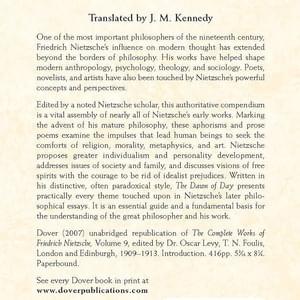
The Dawn of Day (Book I) Friedrich Nietzsche (Ft. John McFarland Kennedy)
На этой странице вы найдете полный текст песни "The Dawn of Day (Book I)" от Friedrich Nietzsche (Ft. John McFarland Kennedy). Lyrxo предлагает вам самый полный и точный текст этой композиции без лишних отвлекающих факторов. Узнайте все куплеты и припев, чтобы лучше понять любимую песню и насладиться ею в полной мере. Идеально для фанатов и всех, кто ценит качественную музыку.

1.
Subsequent Judgment.—All things that endure for a long time are little by little so greatly permeated by reason that their origin in unreason becomes improbable. Does not almost every exact statement of an origin strike us as paradoxical and sacrilegious? Indeed, does not the true historian constantly contradict?
2.
Prejudice of the Learned.—Savants are quite correct in maintaining the proposition that men in all ages believed that they knew what was good and evil, praiseworthy and blamable. But it is a prejudice of the learned to say that we now know it better than any other age.
3.
A Time for Everything.—When man assigned a sex to all things, he did not believe that he was merely playing; but he thought, on the contrary, that he had acquired a profound insight:—it was only at a much later period, and then only partly, that he acknowledged the enormity of his error. In the same way, man has attributed a moral relationship to everything that exists, throwing the cloak of ethical significance over the world's shoulders. One day all that will be of just as much value, and no more, as the amount of belief existing to-day in the masculinity or femininity of the sun.2
4.
Against the Fanciful Disharmony of the Spheres.—We must once more sweep out of the world all this false grandeur, for it is contrary to the justice that all things about us may claim. And for this reason we must not see or wish the world to be more disharmonic than it is!
5.
Be Thankful!—The most important result of the past efforts of humanity is that we need no longer go about in continual fear of wild beasts, barbarians, gods, and our own dreams.
6.
The Juggler and his Counterpart.—That which is wonderful in science is contrary to that which is wonderful in the art of the juggler. For the latter would wish to make us believe that we see a very simple causality, where, in reality, an exceedingly complex causality is in operation. Science, on the other hand, forces us to give up our belief in the simple causality exactly where everything looks so easily comprehensible and we are merely the victims of appearances. The simplest things are very “complicated”—we can never be sufficiently astonished at them!
7.
Subsequent Judgment.—All things that endure for a long time are little by little so greatly permeated by reason that their origin in unreason becomes improbable. Does not almost every exact statement of an origin strike us as paradoxical and sacrilegious? Indeed, does not the true historian constantly contradict?
2.
Prejudice of the Learned.—Savants are quite correct in maintaining the proposition that men in all ages believed that they knew what was good and evil, praiseworthy and blamable. But it is a prejudice of the learned to say that we now know it better than any other age.
3.
A Time for Everything.—When man assigned a sex to all things, he did not believe that he was merely playing; but he thought, on the contrary, that he had acquired a profound insight:—it was only at a much later period, and then only partly, that he acknowledged the enormity of his error. In the same way, man has attributed a moral relationship to everything that exists, throwing the cloak of ethical significance over the world's shoulders. One day all that will be of just as much value, and no more, as the amount of belief existing to-day in the masculinity or femininity of the sun.2
4.
Against the Fanciful Disharmony of the Spheres.—We must once more sweep out of the world all this false grandeur, for it is contrary to the justice that all things about us may claim. And for this reason we must not see or wish the world to be more disharmonic than it is!
5.
Be Thankful!—The most important result of the past efforts of humanity is that we need no longer go about in continual fear of wild beasts, barbarians, gods, and our own dreams.
6.
The Juggler and his Counterpart.—That which is wonderful in science is contrary to that which is wonderful in the art of the juggler. For the latter would wish to make us believe that we see a very simple causality, where, in reality, an exceedingly complex causality is in operation. Science, on the other hand, forces us to give up our belief in the simple causality exactly where everything looks so easily comprehensible and we are merely the victims of appearances. The simplest things are very “complicated”—we can never be sufficiently astonished at them!
7.
Комментарии (0)
Минимальная длина комментария — 50 символов.












